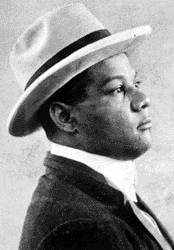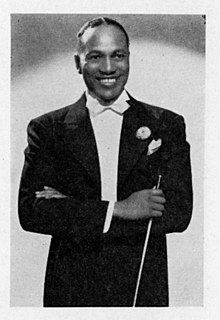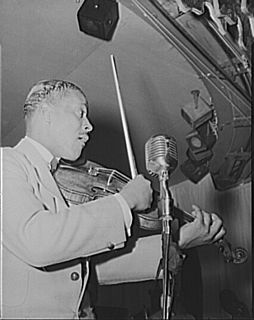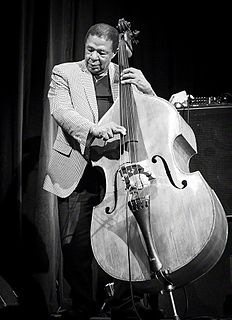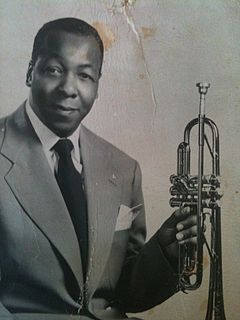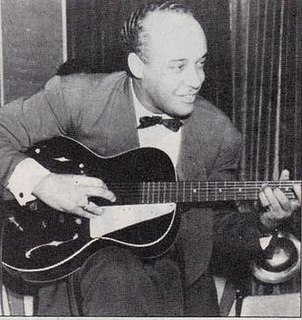This article needs additional citations for verification .(April 2017) (Learn how and when to remove this template message) |
John Overton "Bearcat" Williams (April 13, 1905 – November 24, 1996) was an American jazz reedist.
Jazz is a music genre that originated in the African-American communities of New Orleans, United States, in the late 19th and early 20th centuries, and developed from roots in blues and ragtime. Jazz is seen by many as "America's classical music". Since the 1920s Jazz Age, jazz has become recognized as a major form of musical expression. It then emerged in the form of independent traditional and popular musical styles, all linked by the common bonds of African-American and European-American musical parentage with a performance orientation. Jazz is characterized by swing and blue notes, call and response vocals, polyrhythms and improvisation. Jazz has roots in West African cultural and musical expression, and in African-American music traditions including blues and ragtime, as well as European military band music. Intellectuals around the world have hailed jazz as "one of America's original art forms".
Williams was born in Memphis, Tennessee, but moved to Kansas City in his youth and learned to play saxophone there as a teenager, playing in a local dance band and touring with the vaudeville revue, Hits 'n Bits , in the first half of the 1920s. While with this show he met pianist Mary Lou Burley, who became both a personal and professional companion; the pair married in 1926 and Burley played piano in Williams' Synco Jazzers band on their 1927 tour and recording session. He then played with Terrence Holder's band, which Andy Kirk took over soon after; Williams played with Kirk for nearly a decade alongside his wife.

Memphis is a city located along the Mississippi River in southwestern Shelby County, Tennessee, United States. The 2017 city population was 652,236, making Memphis the largest city on the Mississippi River, second-largest city in Tennessee, as well as the 25th largest city in the United States. Greater Memphis is the 42nd largest metropolitan area in the United States, with a population of 1,348,260 in 2017. The city is the anchor of West Tennessee and the greater Mid-South region, which includes portions of neighboring Arkansas and Mississippi. Memphis is the seat of Shelby County, the most populous county in Tennessee. As one of the most historic and cultural cities of the southern United States, the city features a wide variety of landscapes and distinct neighborhoods.

Vaudeville is a theatrical genre of variety entertainment born in France at the end of the 18th century. A vaudeville was originally a comedy without psychological or moral intentions, based on a comical situation: a kind of dramatic composition or light poetry, interspersed with songs or ballets. It became popular in the United States and Canada from the early 1880s until the early 1930s, but the idea of vaudeville's theatre changed radically from its French antecedent.
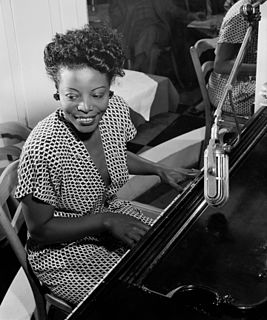
Mary Lou Williams was an American jazz pianist, arranger, and composer. She wrote hundreds of compositions and arrangements and recorded more than one hundred records. Williams wrote and arranged for Duke Ellington and Benny Goodman, and she was friend, mentor, and teacher to Thelonious Monk, Charlie Parker, Miles Davis, Tadd Dameron, Bud Powell, and Dizzy Gillespie.
In 1939 he left Kirk's group, and divorced Williams the following year. He went into the restaurant industry in the 1940s, but still played on the side with Cootie Williams and for several years with Earl Hines on baritone sax. His last performances were in the late 1940s, after which he worked in hospitality and in a factory. He died in Columbus, Ohio, aged 91.
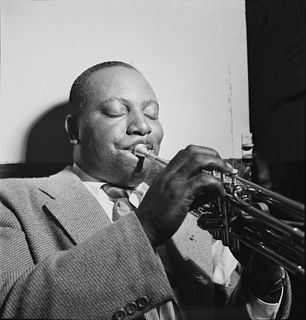
Charles Melvin "Cootie" Williams was an American jazz, jump blues, and rhythm and blues trumpeter.

Earl Kenneth Hines, universally known as Earl "Fatha" Hines, was an American jazz pianist and bandleader. He was one of the most influential figures in the development of jazz piano and, according to one major source, is "one of a small number of pianists whose playing shaped the history of jazz".

Columbus is the state capital of and the most populous city in the U.S. state of Ohio. With a population of 879,170 as of 2017 estimates, it is the 14th-most populous city in the United States and one of the fastest growing large cities in the nation. This makes Columbus the third-most populous state capital in the US and the second-most populous city in the Midwest. It is the core city of the Columbus, OH Metropolitan Statistical Area, which encompasses ten counties. With a population of 2,078,725, it is Ohio's second-largest metropolitan area.

